新概念第二册18课
新概念英语2第18课 NCE2_Lesson18
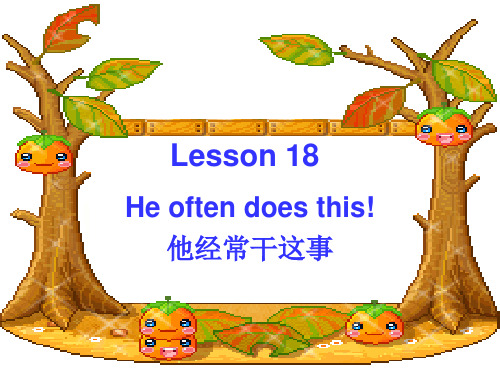
• 7、'I'm very sorry,' he said.
'My dog had taken in into the
garden. He often does this!'
钱
• 3 He had to leave early. ⑶...换... • 4 We have had a long conversation. ⑷...不换...
进行
• 5 My mother has a headache. ⑸...换... 患病 • 6 They had a good time at the party. ⑹...不换... • have a good/long time : 过的愉快(固定短语)
其他事要做。
Summary
New words :
pub [pʌb] n. 小酒店
landlord ['lændlɔ:d]n. 店主,地主 bill [bil] n. 账单,比尔
He 指宠物、she 山川、湖泊、国家、建筑
Have 三种常见用法 As….. , …. 正当…的时候,…发生了
Look for 寻找
Special difficulties
give的几个固定搭配
1.give常用含义是“给予,交给” I lent him some books last month and he has given them back
to me this morning. 2.gave away 赠送 • He gave away all his books to the library. 3.give in 上交,呈交;屈服,让步,投降 • Give in your examination papers after you’ve finished. • You can do what you like. I will never give in. 4.give up doing sth. 放弃,抛弃 • He gave up drinking a few years ago. 5.give up 交出,让出 • Jack has given up the watch he stole last week. • Three of our officers gave themselves up to the enemy. 我
新概念英语-第二册第18课

had +过去分词
表示过去的时间或动作之前发生的动作,先发生的动作用过去完成时,后发生 的动作用一般过去时。
After he had finished his work, he went out.
过去分词的构成:
become-became-become
3) ABB 4) ABC
sit-sat-sat say-said-said sing-sang-sung
drink-drank-drunk
take-took-taken
构成:助动词had + 动词的过去 分词(V.pp)
在强调过去某一个动作发生在另一个动作前常常用 过去完成时态。
1. 规则动词的变化:
a) 一般情况下在动词后面加 ed work ------ worked play -------- played
b) 以 e 结尾的动词直接加 d
use ------ used
refuse ------ refused
c) 以辅音字母加 y 结尾的动词,把 y 改 i 再加 ed
2. 过去完成时词可以表示过去某一 时刻之前发生的动作或呈现的状态 ,这一动作一直持续 或将继续下去 。
1. 到了六点钟为止,他们已经工作了八小时了。
By six o’clock theyh_a_d_w__o_rk_e_d____ (work)for eight hours.
2. 我到广州时,他在那里很长时间了。
When I came to GZ , he h_a_d__b_e_e_n______(be) there for a long time.
新概念英语第二册第18课ppt课件
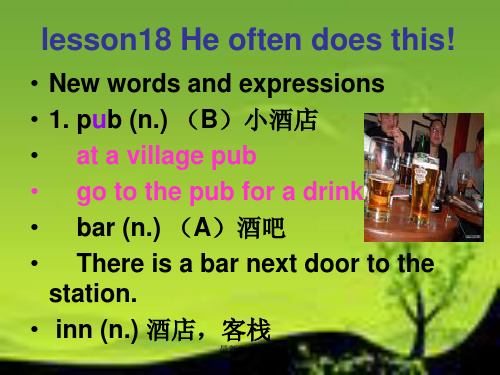
• have a good meal
'Yes, thank you,' I answered,
最新版整理ppt
5
'but I can't pay the bill.
pay the bill
I haven't got my bag.‘
have = have got = own = possess
• The landlord smiled and immediately went out.
• 在一家乡村小酒店
• I had left it on a chair beside the door and now it wasn't there !
• leave sth. sp.
• 把…落在..
• I left a suitcase on the train to London.
• beside (prep.) = next to
7
• 'I'm very sorry,' he said
‘ My dog had taken it into the garden.
take sth. to/into sp. 把…带到/带进…
Their father takes them to school everyday.
He often does this.' He 指My dog
•
☺传单,海报
• put up a bill on the wall
• billboard (n.)
• 宣传板,宣传栏 ad had lunch at a village pub, I looked for my bag.
新概念二 第18课课件

课文注释
beside与besides
介词beside常用的含义为“在……旁边”、“在……附近”: Come and sit beside us.过来坐在我们旁边吧。 There is a chair beside the door.门旁边有一把椅子。 besides的词形与beside很相似,但意义却相差甚远。 besides作副词时表示“而且”、“并且”、“此外”等意思:
完全动词have
在其他时态中,一般用have而不用 have got He had a Ford last year.去年他有过一辆福特牌汽车。 I have had this car for three years.这辆汽车我已用了3年了。 Last week, Jimmy had a bad cold上星期吉米得了重感冒。 (3)have作完全动词时,还可以表示eat,drink,enjoy,take等意思,这时它是行为动词,可以 用于包括进行时的各种时态: Have a cigarette, Sam.萨姆,请抽烟。 We will have dinner at seven o'clock.我们将于7点开饭。 Sam and I had lunch together today.我和萨姆今天一起吃的午饭。 I'm having a drink.我正在喝点东西。
除了我们以外,晚会上还有许多(其他)人。
课文注释
3. Mydoa had taken it into the garden. He often does this! 我的狗把它弄到花园里去了,他常干这种事! he在这里指代的是狗。动物通常用it来代表,即被看成像东西一样。但是,指宠物、家畜或民间 故事中的动物时,我们经常也用he,she,who等,即使得它们“人格化”并具有性别。用阴性代词指 某个动物或东西时尤其有一种亲切的含义: have a little cat. She drinks milk every morning 我有一只小猫。她每天早上喝牛奶。
新概念英语第二册第18课
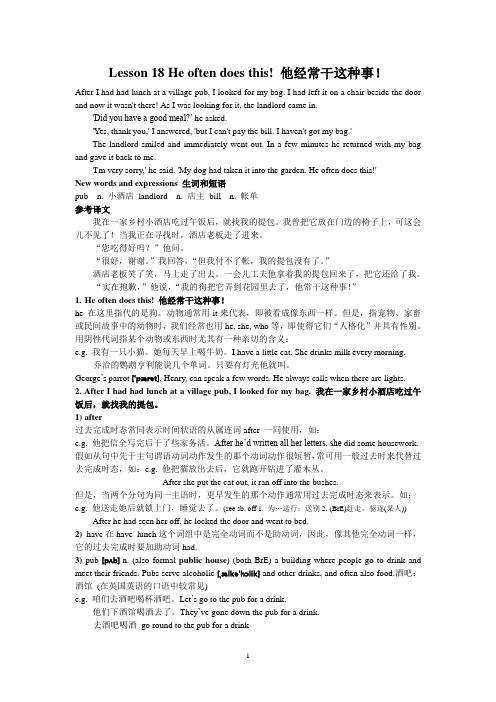
Lesson 18 He often does this! 他经常干这种事!After I had had lunch at a village pub, I looked for my bag. I had left it on a chair beside the door and now it wasn't there! As I was looking for it, the landlord came in.'Did you have a good meal?’ he asked.'Yes, thank you,' I answered, 'but I can't pay the bill. I haven't got my bag.'The landlord smiled and immediately went out. In a few minutes he returned with my bag and gave it back to me.'I'm very sorry,' he said. 'My dog had taken it into the garden. He often does this!'New words and expressions 生词和短语pub n. 小酒店landlord n. 店主bill n. 帐单参考译文我在一家乡村小酒店吃过午饭后,就找我的提包。
我曾把它放在门边的椅子上,可这会儿不见了!当我正在寻找时,酒店老板走了进来。
“您吃得好吗?”他问。
“很好,谢谢。
”我回答,“但我付不了帐,我的提包没有了。
”酒店老板笑了笑,马上走了出去。
一会儿工夫他拿着我的提包回来了,把它还给了我。
“实在抱歉,”他说,“我的狗把它弄到花园里去了,他常干这种事!”1.He often does this! 他经常干这种事!he 在这里指代的是狗。
新概念英语第二册Lesson18

Lesson 18 He often does this! 他经常干这种事! First listen and then answer the question. What had happened to the writer's bag? After I had had lunch at a village pub, I looked for my bag. I had left it on a chair beside the door and now it wasn't there! As I was looking for it, the landlord came in. 'Did you have a good meal?" he asked. 'Yes, thank you,' I answered, 'but I can't pay the bill. I haven't got my bag.' The landlord smiled and immediately went out. In a few minutes he returned with my bag and gave it back to me. 'I'm very sorry,' he said. 'My dog had taken it into the garden. He often does this!'
新概念英语第二册课件Lesson18
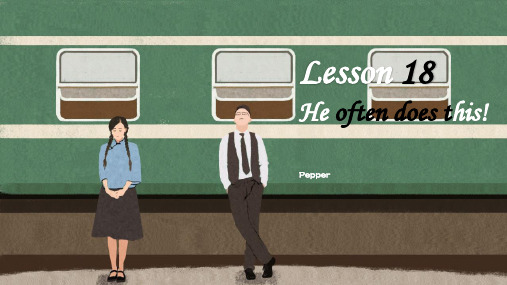
leave sth. with sb. leave sth. to sb.
表示"暂存",以后还要取回 表示以后不再索还
leave
使役动词,表示"使/ 让……保持某种状态" 出去时,不要关门。 Leave the door open when you go out. 形容词作宾语补足语 让他自个儿去做。 Leave him to do it himself. 不定式作宾语补足语 他们走开了,让我一个人坐在那儿。 They walked off and left me sitting there alone.
Lesson 18
He often does this!
Pepper
Daily Proverb
Know the enemy and know yourself, and you can
fight a hundred battles with no danger of defeat.
知己知彼,百战不殆
have用于某些短语,表示固定的意思。 1.had better+不带to的动词不定式,表示“…最好…” I'd better go and look for him now.
2.have nothing(something)to do with,表示“和…无(有)”关系。 Most of questions had nothing to do with Edison's lessons.
出卖,赠送 The strikers wouldn't give in. 投降,屈服 The flower gives off a good smell. 发出(光,味道等等)
发出(光,味道等等)
新概念英语第二册lesson18精品PPT课件
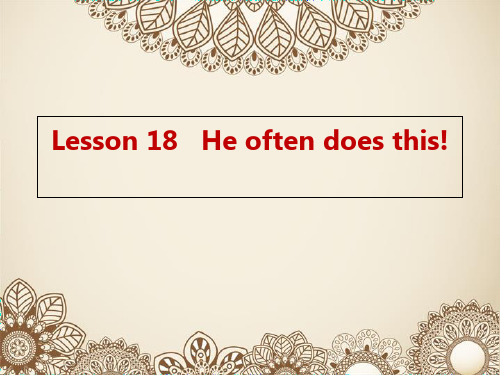
住客栈
2 landlord
(1)主人, 房东(旅馆,家庭,公寓)
(2)地主
lord n . 统治者,主人,贵族,勋爵
Lord! 天啊!哎呀!哎哟! as drunk as a lord 酩酊大醉
landlady 女主人;
3 Bill 1) n. 账单,纸币 (note)
2) n. 招贴,广告,海报
1) n. 账单,纸币 (note) pay the bill/settle the bill
付账
It’s wrong to leave a hotel without paying all your bills. 没有付账离开旅馆是不对的。
新概念英语第二册第18课(revise)
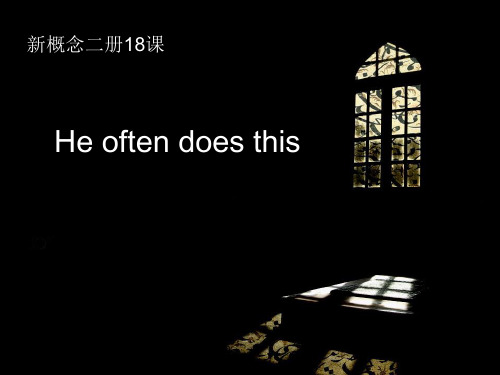
(4) at a village pub
I like village pubs.
(5) look for(寻找)
我正在找我的铅笔。 I am looking for my pencil.
Wonderful sentences
2.I had left it on a chair beside the door and now it wasn’t there. 精彩点: (1)had left (2)leave something on …(把…遗忘在…)
McDonald’ s Menu
Wonderful sentences
5.In a few minutes he returned with my bag and give it back to me . 精彩点: (1)in a few minutes(一会儿以后) (2)returned with (带着…回来)
这个小女孩站在大门口。
The girl stand beside the door.
Wonderful sentences
3.As I was looking for it ,the landlord came in. 精彩点: (1)过去进行时的完美使用 (2)as somebody was v-ing…,something happened 当我在唱歌时,他进来了。 When I was singing , he came in. 当我正上课时,外面下起了暴雨。 When I was having the class, the heavy rain began.
P25.P65
现在完成时 Have、has + 过去分词
新概念英语第二册第18课
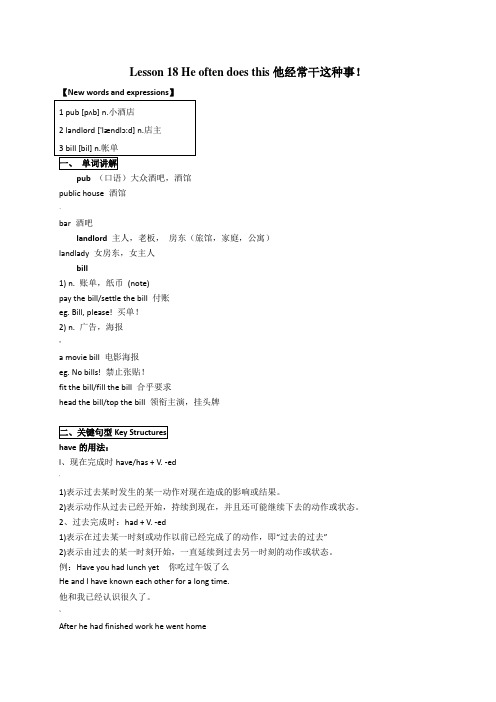
Lesson 18 He often does this他经常干这种事!【New words and expressions】1 pub [pʌb] n.小酒店2 landlord ['lændlɔ:d] n.店主3 bill [bil] n.帐单一、单词讲解pub(口语)大众酒吧,酒馆public house 酒馆、bar 酒吧landlord主人,老板,房东(旅馆,家庭,公寓)landlady 女房东,女主人bill1) n. 账单,纸币(note)pay the bill/settle the bill 付账eg. Bill, please! 买单!2) n. 广告,海报*a movie bill 电影海报eg. No bills! 禁止张贴!fit the bill/fill the bill 合乎要求head the bill/top the bill 领衔主演,挂头牌二、关键句型Key Structureshave的用法:l、现在完成时have/has + V. -ed'1)表示过去某时发生的某一动作对现在造成的影响或结果。
2)表示动作从过去已经开始,持续到现在,并且还可能继续下去的动作或状态。
2、过去完成时:had + V. -ed1)表示在过去某一时刻或动作以前已经完成了的动作,即“过去的过去”2)表示由过去的某一时刻开始,一直延续到过去另一时刻的动作或状态。
例:Have you had lunch yet 你吃过午饭了么He and I have known each other for a long time.他和我已经认识很久了。
~After he had finished work he went home他完成工作后回家了。
We had been waitiing for an hour when he showed up.他出现时,我们己经等了一个小时了。
新概念英语2_第18课
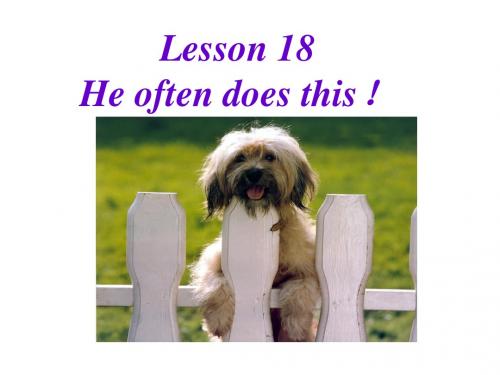
3.have可译为“拥有”=have got.但have got常用于一般现 在时,其他时态中用have. 在英式英语中,have用法与be相同,即可以不用助动词 do/does/did进行否定和疑问。 Eg: He has a pen.—He hasn’t a pen.—Has he a pen?— Yes ,he has.—No, he hasn’t.
The landlord smiled and immediately went out. In a few minutes he returned with my bag and gave it back to me. ‘I'm very sorry,’ he said. ‘My dog had taken it into the garden. He often does this!’ 1. immediately 立刻,马上 同义词:at once, instantly, right away, straight away 2. in a few minutes 几分钟后 类似的说法: in a few days in a few weeks in a few months in a few years
I had left it on a chair beside the door and now it wasn’t there! 1.leave ---left---left a.离开,出发 leave sp离开某地 leave for sp出发去某地 Eg:他要离开重庆。 He will leave Chongqing. 他要出发去重庆。 He will leave for Chongqing. b.把(人、物)留下、丢下、遗留等。 Eg: Have you left anything in the car? 2. beside: prep.在…旁边 Eg:他的汽车正停在那辆卡车的旁边。 His car is parking beside the truck.
新概念英语 第二册 lesson 18
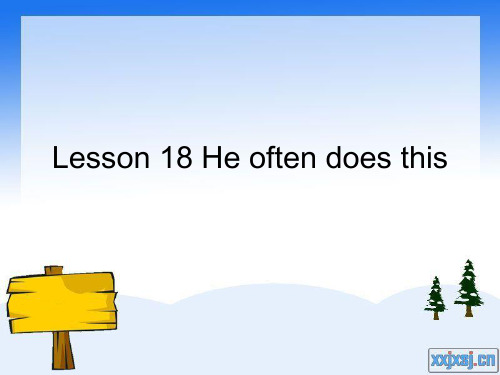
• After I had had lunch at a village pub, I looked for my bag. I had left it on a chair beside the door and now it wasn't there! As I was looking for it, the landlord came in. • 'Did you have a good meal?" he asked. • 'Yes, thank you,' I answered, 'but I can't pay the bill. I haven't got my bag.' • The landlord smiled and immediately went out. In a few minutes he returned with my bag and gave it back to me. • 'I'm very sorry,' he said. 'My dog had taken in into the garden. He often does this!'
Lesson 18 He often does this
lord
• • • • • • [n]上帝,主,贵族 as drunk as a lord 酩酊大醉 Lord !天啊! landlord [n]店主 landlady [n]女店主 pub 小酒店 inn 客栈,小旅馆
新概念英语第二册课件Lesson18

have a cup of tea 5.组成复合结构即“have+宾语+宾语补足语”
You'd better give up smoking. 放弃 give away the prizes 颁发 give the secret away 泄露 出卖,赠送
give in give off give out
The strikers wouldn't give in.投降,屈服 The flower gives off a good smell.发出(光,味道等等)
A. on
B. at
C. in
D. during
5. My grandfather was born ____ Oct. 10, 1935.
A. on
B. in
C. at
D. of
6. The train is starting ___ five minutes.
A. in
B. at
C. for
D. still
表示延续时间的介词 他已经当老师9年了。 He has been a teacher __f_o_r_ nine years.
我已经在这儿住了10年了。 I have lived here _s_in_c_e_ ten years ago.
---No. We can have a game of table tennis.
A. on
B. in
C. out
新概念英语第二册lesson-18
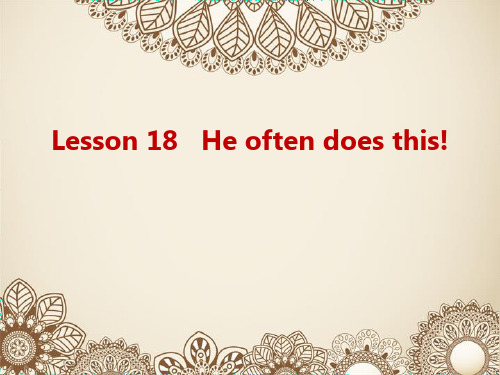
when 1) 当…时候 Come to me when you like. 当你愿意时到我这儿来。 I first met him the day when I arrived here. 我到这儿的那天第一次碰见他。 2) 每逢…时候 When (you are) in trouble, visit this man. 每当你有麻烦的时候,就找这个人。 3) 倘若 He will likely recover when he undergoes the operations. 一旦他经历手术治疗的话,很可能康复。
Leave leave---left---left 1) v. 把(人/物)留下,遗留,丢下 我能把鞋放在这儿吗? May I leave my shoes here? Have you left anything in the car? 你是把所有的东西都落在车里了吗? 2) v. 听任…;使…处于...状态 leave sth + adj./p.p. 别把门开着。 Don’t leave the door open. 话还是不讲出来的好。 Better leave it unsaid. 让它们保持原样。 Leave them as they are. 3) v. 离开 leave some place 离开某个地方 leave for some place 离开去某地 Leave England for a tour of the world. 离开英国去环球旅游。 4) on leave 休假中
take 带走(把某人/物带到某地)
take sb/sth into a place take sb/sth to a place
bring 带来(为某人带去某物)
bring sth to sb bring sb sth
新概念英语第二册课件Lesson18(共14页)
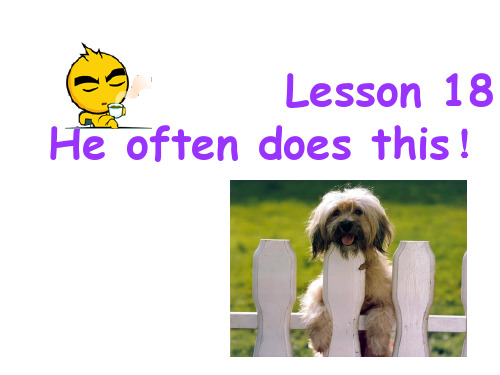
New words and expressions
public house 我们去酒吧喝一杯吧!
Let’s go to the pub for a drink!
landlord ['lændlɔ:d] n. 店主,地主
3. She couldn't pay the bill. 4. The landlord soon found it for her. 5. His dog had taken it into the garden.
1. What happened to the bag?
writer’s
After I had had lunch at a village pub, I looked for my bag.
1. look for 寻找 look after =
take care of 照看 照顾 look out
我要当地主!
I want to become a landlord !
bill [bil] n. 账单,比尔
比尔会替我买单的。 Bill will pay the bill for me.
What do you keep as a pet?
•
Dogs
•
listen to the tape and answer the question:
7. give back归还 give 用法(难点P82) give in 上交,呈交 屈服,让步,投降 gave away 赠送
give up doing sth. 放弃,抛弃 give up 交出,让出
'I'm very sorry,' he said. 'My dog had taken it in into the garden. He often
新概念二第18课
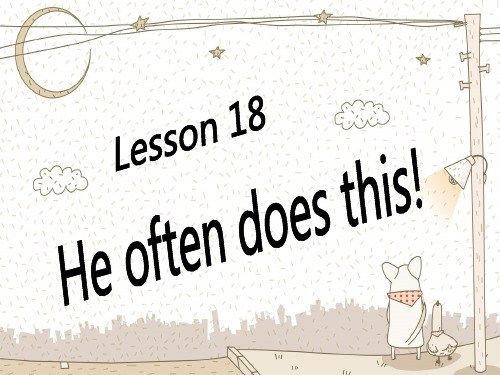
及物动词 vt. 1. 给...开帐单;要...付款 请以后开帐单给我。 Please bill me later.
常用词组
pay bill 工资单
pay the bill 付账 show bill =poster 海报,招贴 kite bill 空头票据
例:His promises to take her to Hong Kong for the weekend were just kite bill .
他答应带她去香港度周末的许诺不过是空头支票。
immediate a. [Z] adv. Immediately
1. 立即的,即刻的 萧先生没有立即回答。 Mr. Shaw made no immediate answer. 2. 目前的,当前的[B] 我们的当务之急是阻止火势向其他建筑物蔓延。 Our immediate concern was to prevent the fire from spreading to other buildings.
have have got own possess occupy
have的用法
一般来说,have got较口语化
Don‘t play near the road. 不要在马路附近玩。
3) next to表示“紧靠……的旁边” 翻译(后置定语) 书店旁边的那幢新楼是一家电影院。
The new building next to the bookstore is a cinema.
4) at 是“在...旁边”,beside也是“在...旁边”。但前者位置 较随便,后者表示在较近的距离。
Insead of saying P81
e.g. It wasn’t there. =It was gone.=It was missing.
- 1、下载文档前请自行甄别文档内容的完整性,平台不提供额外的编辑、内容补充、找答案等附加服务。
- 2、"仅部分预览"的文档,不可在线预览部分如存在完整性等问题,可反馈申请退款(可完整预览的文档不适用该条件!)。
- 3、如文档侵犯您的权益,请联系客服反馈,我们会尽快为您处理(人工客服工作时间:9:00-18:30)。
Answers
At first,the writer left it on a chair beside the door. Then, it was taken into the garden by a dog. Finally, the landlord found it and gave it back to the writer.
After --- lunch --- look for – had left it – and
now--as I was looking for– landlord
good meal – yes– can’t pay the bill– haven’t got Smiled and immediately went out – in a few minutes– returned with – gave it back – sorry – taken it into – often does this
现在完成 have/has + p.p. 过去完成 had+ p.p.
(2)拥有 have=have got
=own,possess 拥有 He owns a farm = He possess a farm =He has a farm =He has got a farm
我有一双小眼睛。 I have got a pair of small eyes.
Exercise time
Finish the exercise in 15-20mins
Homework
1. Copy the new words at page 80; 2. Recite or retell the story to your parents, and get their signature; 3. Prepare an presentation with the title of : The most interesting thing is ** .
Try to find out the line of the can’t pay
the bill– haven’t got (dialogue 对话)
Try to find out the line of the story
Smiled and immediately went out – in a few minutes– returned with – gave it back – sorry – taken it into – often does this (found the bag 找包)
I want to become a landlord !
1. bill [bil] Bill will pay the bill for me.
Listen to the tape listen to the tape and answer the question:
What happened to the writer’s bag?
have to 不得不 Eg.:我不得不努力长胖 I have to grow fat
have to = have got to
summary
1. 现在完成时 “have + 过去分词” 过去完成时 “had + 过去分词”
2. 拥有 have = have got = own = possess 得病 have = have got headache / fever /cough
3. 固定短语 a.have dinner / lunch / breakfast b.have a good time c. Have a bath/ drink/ look/ conversation… d. have to
Key structures:
As I was looking for it, the landlord came in. 当我正在寻找时,酒店老板走了进来。
Summary
New words :
pub [pʌb] n. 小酒店
landlord ['læ ndlɔ:d]n. 店主,地主 bill [bil] n. 账单,比尔 he 指宠物、she 山川、湖泊、国家、建筑 have 三种常见用法 as….. , …. 正当…的时候,…发生了 look for 寻找 look after 照顾 look forward to 期待 in a few minutes 不到几分钟
Retell or recite the story in 10 mins
Retell the story in 10 mins according to your own understandings
Recite the story in 10 mins according to the line
What do you keep as a pet?
Dogs
Lesson 18 He often does this!
New words
pub [pʌb] n. 小酒店 public house 我们去酒吧喝一杯吧! Let’s go to the pub for a drink!
landlord ['læ ndlɔ:d] n. 店主,地主
at least 150 words.
我很期待见到你 I’m looking forward to meeting you.
Key sentence:
In a few minutes he returned with my bag and gave it back to me.
In a few minutes 不到几分钟的时间 In a few days In a few weeks In a few months In a few years
(2)得病 have=have got
Attention!
表示“生病” 不能用own,possess!! I have a stomachache =I have got a stomachache
(3)固定短语
Have a bath/ drink/ look/ conversation…… 洗个澡、喝一杯、看一下、聊一会、、 have a good time =enjoy oneself 玩得开心
Two different “had”s
After I had had lunch …,I looked for my bag.
had 1(past perfect)过去完成时的标志 had 2 吃 have dinner / lunch / a meal
have 的用法 (1)完成时
Have you had lunch yet? 你吃过午饭了吗?
look after 照顾 = take care of 照顾自己 Please look after yourself. 我会照顾(处理)它的。 I’ll look after it = I’ll take care of it
look forward to 期待 + n. / V-ing 我很期待国庆节。 I’m looking forward to the National Day.
我要当地主!
I want to become a landlord !
bill [bil] n. 账单,比尔
Bill will pay the bill for me. 比尔会替我买单的。
Sum up
1. pub [pʌb]
Let’s go to the pub for a drink! 1. landlord ['læ ndlɔ:d]
eg.: 昨晚当我睡着的时候,一只小偷进来了。 As I was sleeping, a thief came in. As…= While… 当…,…发生了
look for 寻找
我在寻找一个快速致富的方法。 I’m looking for a way to get rich quickly. 嘿,你在找茬吧。 Hey,you’re looking for trouble.
